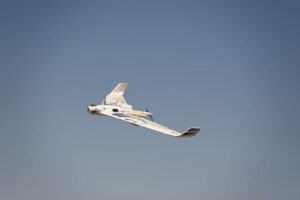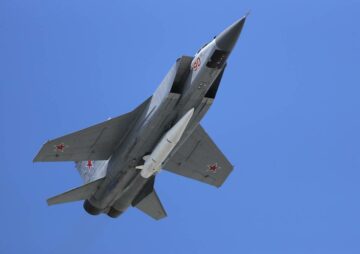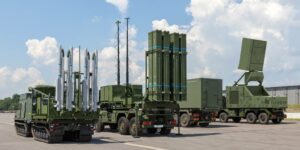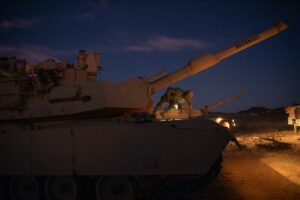
WASHINGTON — A team of U.S. cyber specialists discovered malware during a three-month deployment to Latvia while scouring digital infrastructure for weaknesses.
The so-called hunt-forward operation, conducted by the Cyber National Mission Force, was the second such endeavor in the former Soviet state. It wrapped up “recently,” U.S. Cyber Command announced May 10.
“During the hunt activities in Lativia, the cyber teams found malware, analyzed it and have an increased understanding of the adversary’s [tactics, techniques and procedures],” according to a statement by the command. C4ISRNET inquired about the malware and its potential attribution.
The mission force worked alongside the CERT.LV, Latvia’s primary cyber emergency response team, and the Canadian military. Canada has spearheaded a NATO reinforcement mission in the European nation since 2017.
“With our trusted allies, the U.S. and Canada, we are able to deter cyber threat actors and strengthen our mutual resilience,” Baiba Kaškina, general manager of CERT.LV, said in a statement. “This can only happen through real-life defensive cyber operations and collaboration. The defensive cyber operations conducted allowed us to ensure our state infrastructure is a harder target for malicious cyber actors.”
The CNMF has deployed nearly four dozen times to 22 countries — including Ukraine, ahead of Russia’s invasion, and Albania, in the wake of Iranian cyberattacks — to strengthen far-flung networks and return with insights that can be applied stateside.
The U.S. considers China and Russia its most significant cyberthreats. Iran and North Korea also make the list, to a lesser degree.
Kaškina described Latvia as a favorite target of “Russian hacktivists and Russian state-supporting hacking groups.” The Latvian government has blamed Russian outfits for phishing and distributed denial-of-service attacks.
Hunt-forward operations are defensive efforts taken at the invitation of a foreign government. They are part of CYBERCOM’s persistent engagement strategy, a means of being in constant contact with adversaries while ensuring proactive, rather than reactive, moves are made.
“Adversaries often use spaces outside the U.S. as a testbed for cyber tactics, which they may use later to access U.S. networks,” U.S. Army Maj. Gen. William Hartman, the commander of the mission force, said in a statement. “But with our hunt forward missions, we can deploy a team of talented people to work with our partners, find that activity before it harms the U.S., and better posture the partner to harden critical systems against bad actors who threaten us all.”
Latvia supports Ukraine in its fight to repel Russian troops, committing to the embattled nation anti-aircraft Stinger missiles, guns, drones, ammunition and more.
Colin Demarest는 C4ISRNET의 기자로 군사 네트워크, 사이버 및 IT 분야를 다루고 있습니다. Colin은 이전에 사우스캐롤라이나의 일간지에서 에너지부와 국가핵안보청(냉전 정화 및 핵무기 개발)을 다루었습니다. Colin은 수상 경력에 빛나는 사진 작가이기도 합니다.
- SEO 기반 콘텐츠 및 PR 배포. 오늘 증폭하십시오.
- PlatoAiStream. Web3 데이터 인텔리전스. 지식 증폭. 여기에서 액세스하십시오.
- 미래 만들기 w Adryenn Ashley. 여기에서 액세스하십시오.
- PREIPO®로 PRE-IPO 회사의 주식을 사고 팔 수 있습니다. 여기에서 액세스하십시오.
- 출처: https://www.defensenews.com/cyber/2023/05/10/us-cyber-team-unearths-malware-during-hunt-forward-mission-in-latvia/
- :있다
- :이다
- :어디
- $UP
- 11
- 2017
- 22
- 70
- a
- 할 수 있는
- 소개
- ACCESS
- 에 따르면
- 방과 후 액티비티
- 활동
- 배우
- 관리
- 반대
- 앞으로
- All
- 함께
- 또한
- 탄약
- an
- 및
- 발표
- 적용된
- 있군요
- 육군
- AS
- At
- 공격
- 수상 경력
- 나쁜
- BE
- 전에
- 존재
- 더 나은
- by
- CAN
- Canada
- 캐나다의
- 중국
- 저온
- 협동
- 커밋
- 실시
- 고려하다
- 상수
- CONTACT
- 국가
- 적용
- 커버
- 임계
- 사이버
- 사이버 공격
- 매일
- 방어적인
- 도
- 학과
- 에너지 부
- 배포
- 배포
- 전개
- 기술 된
- 개발
- 디지털
- 발견
- 분산
- 다스
- 드론
- ...동안
- 노력
- 비상 사태
- 노력하다
- 에너지
- 약혼
- 확인
- 보장
- 유럽
- 즐겨찾기
- 싸우다
- Find
- 럭셔리
- 힘
- 외국의
- 이전
- 앞으로
- 발견
- 사
- 세대
- Government
- 여러 떼
- 총
- 컴퓨터 조작을 즐기기
- 발생
- 초래할 수
- 있다
- he
- HTTPS
- 형상
- in
- 포함
- 증가
- 인프라
- 통찰력
- 침입
- 초대장
- 이란
- 이란의
- IT
- 그
- JPG
- 한국
- 후에
- 라트비아
- 라트비아 사람
- 보다 작은
- 명부
- 만든
- 확인
- 악성 코드
- 매니저
- XNUMX월..
- 방법
- 군
- 미사일
- Mission
- 선교
- 배우기
- 가장
- 이동
- 공동의
- 즉
- 민족
- 국가의
- 거의
- 네트워크
- North
- 북한
- 핵무기
- 핵무기
- of
- 자주
- 만
- 조작
- 행정부
- 우리의
- 외부
- 부품
- 파트너
- 파트너
- 사람들
- 피싱
- 사진 작가
- 플라톤
- 플라톤 데이터 인텔리전스
- 플라토데이터
- 가능성
- 이전에
- 일차
- 사전
- 절차
- 차라리
- 신고자
- 되튀기
- 응답
- return
- 러시아
- 러시아인
- s
- 말했다
- 둘째
- 보안
- 상당한
- 이후
- 남쪽
- 사우스 캐롤라이나
- 공간
- 전문가
- 주 정부
- 성명서
- 강하게 하다
- 이러한
- 지원
- 시스템은
- 전술
- 재능
- 목표
- 팀
- 팀
- 기법
- 보다
- 그
- XNUMXD덴탈의
- 그들
- 위협
- 위협 행위자
- 위협하다
- 을 통하여
- 시대
- 에
- 신뢰할 수있는
- 우리
- 우크라이나
- 이해
- us
- 사용
- 깨워
- 전쟁
- 였다
- we
- 무기
- 어느
- 동안
- 누구
- 과
- 작업
- 일
- 포장
- 제퍼 넷












